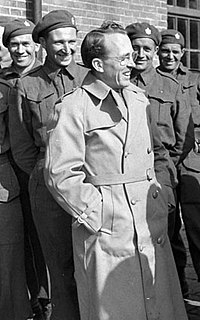The Canadian social credit movement is a Canadian political movement originally based on the Social Credit theory of Major C. H. Douglas. Its supporters were colloquially known as Socreds in English and créditistes in French. It gained popularity and its own political party in the 1930s, as a result of the Great Depression.

The Canadian federal election of 1972 was held on October 30, 1972, to elect members of the House of Commons of Canada of the 29th Parliament of Canada. It resulted in a slim victory for the governing Liberal Party, which won 109 seats, compared to 107 seats for the opposition Progressive Conservatives. A further 48 seats were won by other parties and independents. On election night, the results appeared to give 109 seats to the Tories, but once the counting had finished the next day, the final results gave the Liberals a minority government and left the New Democratic Party led by David Lewis holding the balance of power. See 29th Canadian parliament for a full list of MPs elected.

The Canadian federal election of 1957 was held June 10, 1957, to select the 265 members of the House of Commons of Canada. In one of the great upsets in Canadian political history, the Progressive Conservative Party, led by John Diefenbaker, brought an end to 22 years of Liberal rule, as the Tories were able to form a minority government.

The Canadian federal election of 1968 was held on June 25, 1968, to elect members of the House of Commons of Canada of the 28th Parliament of Canada. The Liberal Party won a majority government under its new leader, Prime Minister Pierre Trudeau.

The Ralliement créditiste du Québec was a provincial political party in Quebec, Canada that operated from 1970 to 1978. It promoted social credit theories of monetary reform, and acted as an outlet for the expression of rural discontent. It was a successor to an earlier social credit party in Quebec, the Union des électeurs which ran candidates in the 1940s.
Les Démocrates was a provincial political party in Quebec, Canada, founded by former Ralliement créditiste du Québec leader Camil Samson and former Progressive Conservative Party of Canada federal cabinet minister Pierre Sévigny on November 18, 1978. It was renamed the Parti démocrate créditiste on January 1, 1980, a reference to the social credit theory of monetary economics. Samson joined the Liberal Party of Quebec on September 2, 1980. Sévigny remained as party leader and initially campaigned prior to the 1981 Quebec election but he did not stand as a candidate himself and the party was unable to field a slate of 10 candidates and dissolved prior to the election.

The Canadian federal election of 1980 was held on February 18, 1980, to elect members of the House of Commons of Canada of the 32nd Parliament of Canada. It was called when the minority Progressive Conservative government led by Prime Minister Joe Clark was defeated in the Commons.

The Canadian federal election of 1979 was held on May 22, 1979, to elect members of the House of Commons of Canada of the 31st Parliament of Canada. It resulted in the defeat of the Liberal Party of Canada after 11 years in power under Prime Minister Pierre Trudeau. Joe Clark led the Progressive Conservative Party to power, but with only a minority of seats in the House of Commons. The Liberals, however, did beat the Progressive Conservatives in the overall popular vote by more than 400,000 votes.

The Canadian federal election of 1958 was the 24th general election in Canada's history. It was held to elect members of the House of Commons of Canada of the 24th Parliament of Canada on March 31, 1958, just nine months after the 23rd election. It transformed Prime Minister John Diefenbaker's minority into the largest majority government in Canadian history and the second largest percentage of the popular vote. Although the Tories would surpass their 1958-seat total in the 1984 election, the 1958 result remains unmatched both in terms of percentage of seats (78.5%) and the size of the Government majority over all opposition parties. Voter turnout was 79.4%.

The Canadian federal election of 1962 was held on June 18, 1962 to elect members of the House of Commons of Canada of the 25th Parliament of Canada. When the election was called, Progressive Conservative (PC) Prime Minister John Diefenbaker had governed for four years with the then-largest majority in the House of Commons in Canadian history.

The Canadian federal election of 1963 was held on April 8 to elect members of the House of Commons of Canada of the 26th Parliament of Canada. It resulted in the defeat of the minority Progressive Conservative (Tory) government of Prime Minister John Diefenbaker. For Social Credit, despite getting their highest ever share of the vote, the party lost 6 seats compared to its high-water mark in 1962.

The Saskatchewan general election of 1960 was the fourteenth provincial election held in the Canadian province of Saskatchewan. It was held on June 8, 1960, to elect members of the Legislative Assembly of Saskatchewan.
Camil Samson was a politician in Quebec, Canada, Member of the National Assembly of Quebec (MNA), and leader of the Ralliement créditiste du Québec and other political parties.

Gatineau is a federal electoral district in Quebec, Canada, represented in the House of Commons of Canada from 1949 to 1988 and since 1997.
In 1963, the Quebec wing of the Social Credit Party of Canada split off from the national party as the Ralliement des créditistes. The split had its roots in a long-standing dispute between the de facto leader of the Ralliement, Réal Caouette, and the party’s national leader, Robert N. Thompson. At the party’s 1960 leadership convention, held two years after the party lost all of its seats in the House of Commons of Canada, Thompson defeated Caouette for the leadership. The party returned to Parliament in the 1962 federal election, but all but four of its 29 MPs came from Quebec. Under the circumstances, Thompson was all but forced to name Caouette as deputy leader of the party. The relationship was strained, however, and the strain was exacerbated when the party failed to make any gains in its old heartland of the Prairies in the 1963 federal election. Only Thompson and three others were elected outside of Quebec, while 20 Socreds were elected in Quebec. The two factions of the party were not re-united until October 1971.
Jean-Paul Poulin was a politician in the Canadian province of Quebec. He was active in the Canadian social credit movement and led the Parti crédit social uni through four general elections at the provincial level.





















